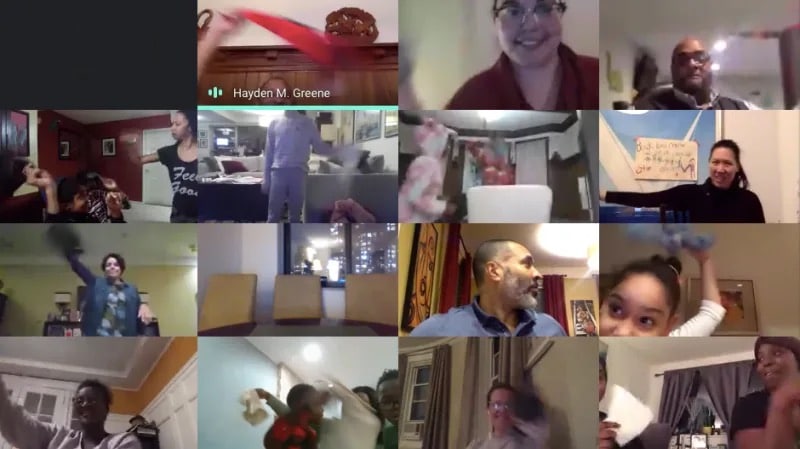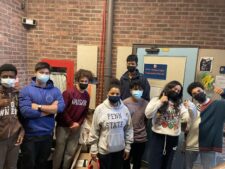It’s Tuesday night at the Ethical Culture Fieldston School, and more than 60 families are gathered on Google Meet. Ethical Culture and Fieldston Middle parent Hayden Greene has the floor, and with a sly smile, he says, “If you’re going to talk about Trinidad, you can’t do it without talking about soca — the music.” He cues up “Famalay” by Skinny Fabulous, Machel Montano, and Bunji Garlin, and the bright visuals of the music video roll over an absolutely joyful beat.
On screen, Greene waves a Trinidadian flag as he dances. “In Trindidadian culture, they say ‘grab something,’ and you have to grab something and wave,” he says. “So grab something — a napkin, a tablecloth, your little sister!” He transitions to Preacher’s “Jump and Wave,” and the attendees scurry around their rooms for a piece of fabric. They grab anything within sight — masks are especially popular. Soon, it’s a full-on dance party, with families dancing from their homes, waving whatever they can find.

It’s a community celebration — the type that the School has been dedicated to fostering during this period of limited in-person interaction — and it provides the opportunity to come together, learn, and experience joy.
On February 23, 2021, families from across all four divisions of ECFS gathered for an evening of celebrating diversity within the Black community and honoring the many people, places, and contributions to society of the African diaspora. The event, organized as part of Black History Month, was spearheaded by All School Multicultural Committee Ethical Culture Co-Chairs Aisha Greene and Michell Tollinchi and Ethical Culture Diversity, Equity, and Inclusion Coordinator Vanessa D’Egidio. Previously, Greene, Tollinchi, and D’Egidio had collaborated with Ethical Culture parent Yamilka Vasquez to host a virtual masterclass on música raíz in celebration of Latinx Heritage Month.
As with the Latinx Heritage Month event, one goal of the evening was to continue to educate students and families at ECFS — in this case, by correcting the misperception of Black identity as a monolithic entity. D’Egidio explains that this subject coincided with the Association for the Study of African American Life and History’s theme for this year’s Black History Month, “The Black Family: Representation, Identity, and Diversity.”
Hayden Greene and Chris Michel, another parent at Ethical Culture and Fieldston Middle, and Russell Marsh, Fieldston Upper Diversity, Equity, and Inclusion Coordinator, stepped up to serve as panelists. Greene, whose family hails from Trinidad and Tobago and who spent his formative years living in the country, spoke about his homeland as a tropical paradise, evoking its rich colors, flavors, and sounds — including the memorable dance party.
“I’m very much steeped in everything Trinidad — the food, the culture, the traditions,” says Greene. “Within meeting me for a few minutes, you’ll figure that out — you’ll either detect a slight accent, or you’ll hear me reference something from there.”
Michel, whose father immigrated to the United States from Haiti in 1963, gave an overview of the country’s history, focusing in particular on the Haitian Revolution, during which the enslaved people successfully overthrew the French colonial government and established their own nation-state.

“We’ve made it a priority to know about Haiti in our family,” says Michel. “When you study the island and you see the portrayal of the country in the media and you know based on your experience there how different it can be — there’s a lot of pride in that.”
Marsh, in turn, talked about Black resistance and revolution in his hometown of Newark, where his parents and grandparents — social justice activists and firm believers in community service — had taken him to all manner of marches, festivals, and demonstrations. He told the story of his young son, Rusty, questioning a teacher in school who taught students that the 19th Amendment gave American women to vote. The amendment in fact only applied to white women, Rusty pointed out, and not to Black women or Asian American women, among other groups. It was a “proud moment” for Marsh, as Rusty was continuing a tradition of questioning people in power on matters of injustice. (As a child, Marsh himself was kicked out of a religion class for asking questions about injustice.)

A key priority of the evening was to highlight different manifestations of Black joy. “We asked volunteers to think about what Black joy looks like as it relates to the places your family is connected to, in the traditions of that place, in community events, and in your own family,” D’Egidio explains. After a year of COVID-19 deaths and losses, police brutality, and white supremacist riots brought to light the systemic racism and racial inequity that persist throughout the United States, celebrating Blackness felt especially important.
“Black joy has always been a form of resistance,” adds Marsh. “Even at the worst that humanity has given us, we still have found pockets of joy.”
Joy was evident throughout the evening. “One of the things about Trinidadians is that they are known as people who like to have fun,” says Greene. “They love a good party. They love to congregate with people.”
Through his historical and cultural presentation on Haiti, Michel made clear that he finds joy in tracing his ancestry to the Haitian Revolution, which inspired uprisings of enslaved peoples throughout the Americas and had a chain effect on ending enslavement in the Western Hemisphere. “There is a pride in being from a place that has had such an impact on the world,” he says.
At home in Newark, Marsh found joy in reading and in music, citing watching Ella Fitzgerald perform on The Abbott and Costello Show as a revelation.
As ECFS continues its mission of providing an ethically grounded progressive education to students, celebrating the diversity found within its community remains vital.
“When you see someone who presents from the African diaspora, they have so many different facets,” says Greene. “It’s not healthy to assume they’re one thing or another. We are very diverse, and even the generation that we came from affects how we interact with American society.”
“There’s a joy that comes from just that difference,” adds Michel. “Not only are we Black, but our specific path of Blackness through this country that has had this very interesting and tortured history really adds a different level to it. We’re able to celebrate our Caribbean traditions, our African traditions, our American traditions. The combination of those things I’ve always felt proud of in making me unique.”



